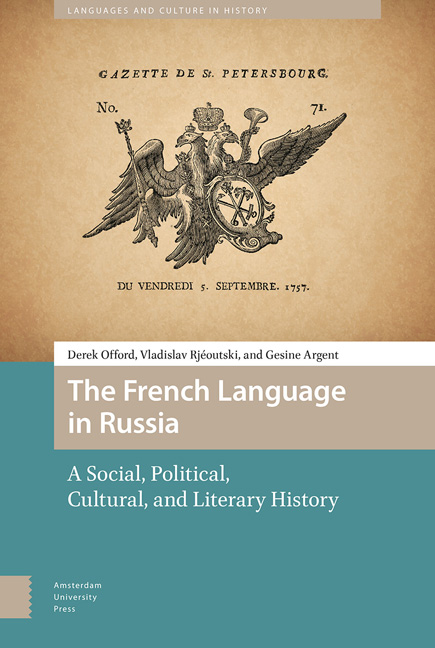Book contents
- Frontmatter
- Contents
- List of illustrations
- Preface
- Acknowledgements
- Presentation of Dates, Transliteration, and other Editorial Practices
- The Romanovs
- Introduction
- Chapter 1 The historical contexts of Russian francophonie
- Chapter 2 Teaching and learning French
- Chapter 3 French at court
- Chapter 4 French in high society
- Chapter 5 French in diplomacy and other official domains
- Chapter 6 Writing French
- Chapter 7 French for cultural propaganda and political polemics
- Chapter 8 Language attitudes
- Chapter 9 Perceptions of bilingualism in the classical Russian novel
- Conclusion The functions of French in imperial Russia
- Bibliography
- Index
- Languages and Culture in History
Chapter 8 - Language attitudes
Published online by Cambridge University Press: 16 February 2021
- Frontmatter
- Contents
- List of illustrations
- Preface
- Acknowledgements
- Presentation of Dates, Transliteration, and other Editorial Practices
- The Romanovs
- Introduction
- Chapter 1 The historical contexts of Russian francophonie
- Chapter 2 Teaching and learning French
- Chapter 3 French at court
- Chapter 4 French in high society
- Chapter 5 French in diplomacy and other official domains
- Chapter 6 Writing French
- Chapter 7 French for cultural propaganda and political polemics
- Chapter 8 Language attitudes
- Chapter 9 Perceptions of bilingualism in the classical Russian novel
- Conclusion The functions of French in imperial Russia
- Bibliography
- Index
- Languages and Culture in History
Summary
Language debate and its place in discourse about national identity
Thus far, we have been concerned mainly with the social, political, and cultural history of Franco-Russian bilingualism. We have considered, for example, where and for what purposes French was spoken or written, how it served the interests of the nobility during the age when the nobility was aspiring to become a corporation of a European sort, and how the use of French by eighteenth-century monarchs and nobles helped to bring Russia into the sphere of European civilization. We have examined the use of French as a language of cultural propaganda and historiosophical or overtly political polemic as well as its incidence in various public and private literary genres. We have put Franco-Russian bilingualism in perspective by noting the use in Russia, at certain times and in certain domains, of foreign languages other than French. We have placed this examination of language use in the changing historical contexts of the eighteenth- and nineteenth-century European and Russian worlds. We have also set our discussion within the frameworks provided by scholarship on the social history and cultural practice of the Russian nobility and by historico-sociolinguistic scholarship on such phenomena as plurilingualism, diglossia, language choice, and code-switching.
We turn now to the dimension of our subject that lies primarily in the fields of intellectual and literary history. That is to say, we shall explore Russian perceptions of the bilingualism of the elite, describing the way it is presented in the nation's mental landscape, whose contours were coming into view in eighteenth- and nineteenth-century Russian literature and thought. The Russian views on linguistic matters that we shall discuss are bound up with the larger debates about national identity and destiny that Russians conducted over the long period with which we are concerned. What effect, for example, did the status of French as a prestige language at court and in the Russian nobility have on conceptions of nationhood among the intellectual and literary elite? The influence of French culture and the French language on the nation’s elite lent urgency, we contend, to the search for national character before, during, and after the Napoleonic Wars and helped to direct that search.
- Type
- Chapter
- Information
- The French Language in RussiaA Social, Political, Cultural, and Literary History, pp. 461 - 518Publisher: Amsterdam University PressPrint publication year: 2018



